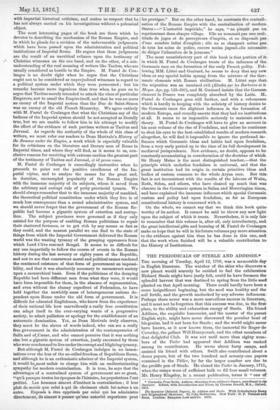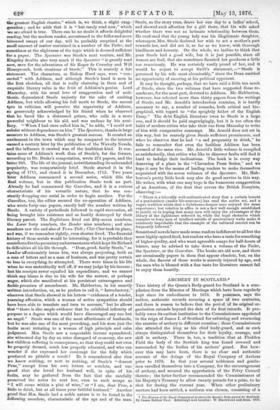THE PERIODICALS OF STEELE AND ADDISON.* THE morning of Tuesday,
April 12, 1709, was- a memorable day in English literature. The watcher of the skies who discovers a. new planet would scarcely be entitled to feel the exhilaration Richard Steele might have justly felt, could he have foreseen the splendid harvest that was destined to spring from the little seed planted on that April morning. There could hardly have been a more insignificant beginning, but the seed was healthy and the soil fertile, and the growth unchecked by any adverse influences.. Perhaps there never was a more marvellous success in literature, and it must not be forgotten that this success was due, in the first place, to the ability and exhaustless energy of Steele. His friend Addison, the exquisite humourist, and the master of the purest. English style, might have never discovered the peculiar bent of his genius, had it not been for Steele ; and the world might never have known, as it now knows them, the immortal Sir Roger de- Coverley, the gallant Will Honeycomb, and the other members of that delightful Club. It was not until more than eighty num- bers of the Tatler had appeared that Addison was ranked among its contributors. He wrote about forty essays, and assisted his friend with others. Swift also contributed about a dozen papers, but of the two hundred and seventy-one papers- contained in the Taller, by far the larger number are due to the prolific pen of Steele. He closed the Taller in January, 1711, when the essays were of sufficient bulk to fill four small volumes. Mr. Henry Kingsley, in a recent publication, terms it "one of • Clarendon Press Series. Addison: Selections frorn Addison's Papers, contributed to the Spectator. Edited, with Introduction and Notes, by Thomas Arnold, M.A., Oxford. 3876.
The Spectator (Selected Papers), by Addison and Steele. With Introductory Basal and Biographical Sketches. By John Habberton. New York: G. P. Putnam and Sons. London: Sampson Low and Co. 1876. Ake greatest English classics," which is, we think, a slight exag- geration; and he adds that it is "but rarely read now," which we are afraid is true. There can be no doubt it affords delightful mailing, but the modern reader, accustomed to the fuller and more laboured essays of our day, will be probably surprised at the small amount of matter contained in a number of the Taller, and sometimes at the slightness of the topic which is deemed sufficient a paper. The Spectator was Steele's next venture, and Mr. Kingsley doubts also very much if the Spectator "is greatly read now, save for the adventures of Sir Roger de Coverley and Will Honeycomb, both creations of Steele." This is scarcely a fair statement,. The characters, as Bishop Hurd says, were " con- certed " with Addison, and although Steele's hand is seen in the first sketches, all that is really charming in them and of exquisite literary value is.. the fruit of Addision's genius. Lord Macaulay, with his usual love of exaggeration and of anti- thesis, depreciated Steele unjustly for the sake of exalting Addison, but while allowing his full merit to Steele, the merest tyro in criticism will perceive the superiority of Addison, so generously acknowledged by his friend when he observed that he fared like a distressed prince, who calls in a more powerful neighbour to his aid, and was undone by his auxi- liary. "When I had once called him in," he adds, "I could not anbsist without dependence on him." The Spectator, thanks in large measure to Addison, was Steele's greatest success. It created an excitement in the town which may be compared to the interest caused a century later by the publication of the Waverly Novels, and the influence it exerted was of the healthiest kind. It con- tains more of Addison's work than of Steele's, for the former, according to Dr. Drake's computation, wrote 274 papers, and the latter 240. The life of the journal, notwithstanding its unbounded popularity, was comparatively brief. Steele started it in the spring of i711, and closed it in December, 1712. Two years later Addison commenced a second series, which fills the final volume, but in this publication Steele took no part. Already he had commenced the Guardian, and it is a curious characteristic of his versatile nature, that he was con- stantly dropping one serial in order to begin another. For the Guardian, too, the editor secured the co-operation of Addison, who wrote forty-one papers, exactly half the number written by Steele. A variety of periodicals followed in rapid succession, all being brought into existence and as hastily destroyed by their literary parent. The Englishman lived out fifty-seven numbers, the Lover forty numbers, the Reader nine numbers ; and nine numbers saw the end also of To ten-Talk ; Chit-Chat took its place, and was, if we remember rightly, even shorter-lived. The financial history of these serials would be interesting, for it is probable they contributedto the pecuniary embarrassments which kept Sir Richard in difficulties all his life through. "Dear, good, faulty Steele," as Lander affectionately terms him, was always projecting, both as man of letters and as a man of business, and was pretty certain to lose in everything he attempted. There were times in his life when he was undoubtedly well off, if we may judge by his income ; but his receipts never equalled his expenditure, and we cannot -think any blame is due to his wife for the sorrow, or perhaps anger, which she manifested at his persistent extravagance and feeble promises of amendment. Mr. Habberton, in his smartly written introduction, or, as he prefers to call it, "Introductory," observes that Steele showed in his letters "evidences of a tender, yearning affection, which a woman of active sympathies should have been able to translate and turn to account," but he allows that "there is also ample evidence that be exhibited infirmity of purpose to a degree which would have discouraged any one but an angel." Steele was one of the most affectionate of husbands, bat he was also one of the most provoking, and his were just the faults most irritating to a woman of high principle and calm judgment. Mrs. Steele saw a respectable income squandered, she witnessed day by day an utter disregard of economy, she saw her children suffering in consequence, so that they could not even be properly dressed, much less properly educated, and who can wonder if she expressed her contempt for the folly which produced so pitiable a result ? Be it remembered also that we know nothing, or next to nothing, of Steele's "dearest Prue," except from his own letters or notelets, and one proof that she loved her husband well, in spite of his faults, may be gathered from the fact that she carefully preserved the notes he sent her, even to such scraps as "I will come within a pint of wine," or "I am, dear Prue, a little in drink, but at all times your faithful husband." Another proof that Mrs. Steele bad a noble nature is to be found in the following anecdote, characteristic of the age and of the man.
Steele, so the story runs, drove her one day to a ladies' school, and showed such affection for a girl there, that his wife asked whether there was not an intimate relationship between them.
He confessed that the young lady was his illegitimate daughter, whereupon Mrs. Steele declared her wish to act a mother's part towards her, and did act it, as far as we know, with thorough
kindliness and honesty. On the whole, we incline to think that poor Steele had a good wife, but it is just possible, since all women are frail, that she sometimes flaunted her goodness a little too consciously. He was certainly vastly proud of her, and it would be unjust to accept Swift's statement,—" Steele is governed by his wife most abominably," since the Dean omitted
no opportunity of sneering at his political opponent.
It may be thought, perhaps, that we have said a little too much of Steele, since the two volumes that have suggested these re- marks are, for the most part, devoted to Addison. Mr. Habberton, however, has selected more than thirty papers from the writings of Steele, and Mr. Arnold's introduction contains, it is hardly necessary to say, a number of remarks, both critical and bio- graphical, with regard to "the sprightly father of the English Essay." The debt English literature owes to Steele is a large one, and it should be paid ungrudgingly, but it is too often the habit of modern critics who take their cue from Macaulay to write
of him with comparative contempt. Mr. Arnold does not err in this way, but he scarcely gives Steele sufficient prominence, and when be observes that he had "a sad propensity to drink," he fails to remember that even the faultless Addison has been accused of the same vice. Mr. Arnold's little volume is compiled so satisfactorily, that critics who like to discover faults will find it hard to indulge their inclinations. The book is in every way deserving of a place in the "Clarendon Press Series," and we hope it may be the means of leading readers to make themselves acquainted with the seven volumes of the Spectator. Mr. Hab-
berton's pretty little book may also do good service in this way. He writes, with what one may hope is the humorous exaggeration of an American, of the dust that covers the British Essayists, observing :—
"There is a tolerably well-authenticated story that a certain inmate of a penitentiary (under life-sentence) has read the entire set, and a vague tradition exists that a lighthouse-keeper once enjoyed the same experience ; but rotation in office is not a fact well enough established to justify us in hoping that many men will enjoy the advantages of the library of the lighthouse referred to, while the legal obstacles which conspire to keep men of intellect outside of penitentiary walls make it extremely improbable that the example of the cultured convict can be frequently followed."
Sensational novels have made some readers indifferent to all but the most highly-spiced food, but readers who have a taste for something of higher quality, and who want agreeable essays for half-hours of leisure, may be advised to take down a volume of the Tarim-, the Spectator, or the Guardian. The books are old now, and there are occasionally papers in them that appear obsolete, but, on the whole, the flavour of these works is scarcely injured by age, and the man who is blessed with a fine taste for literature cannot fail to enjoy them heartily.



































 Previous page
Previous page